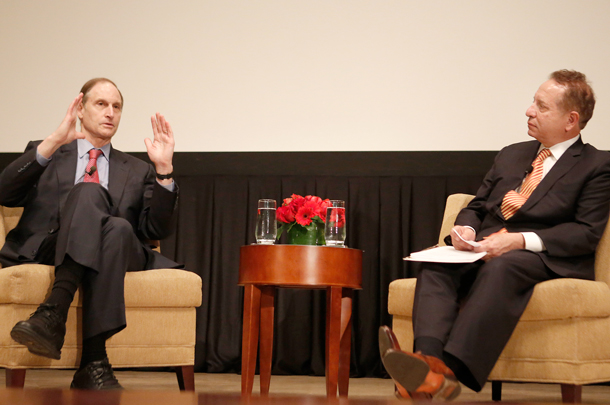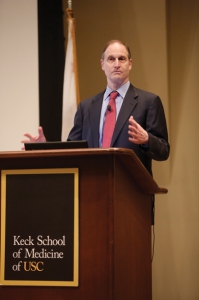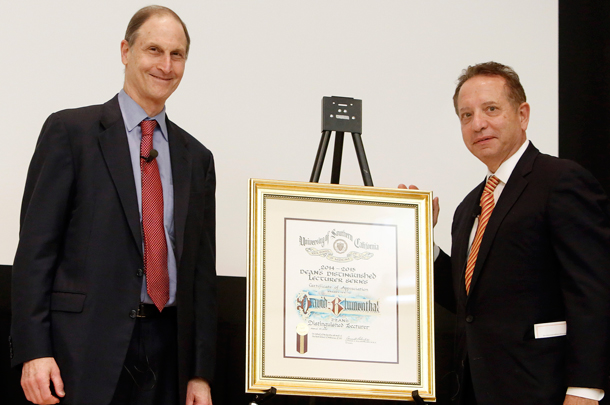U.S. health care is in dire need of repair, said David Blumenthal, MD, MPP, during a March 31 talk titled “Creating a High Performing Health System” in the Keck School of Medicine’s Dean’s Distinguished Lecturer Series.
A former national coordinator for health information technology in the Obama Administration, Blumenthal has been president since 2012 of the Commonwealth Fund, an organization that promotes a health care system that achieves better access, improved quality and greater efficiency by funding independent research and making grants to improve health care practice and policy.
“We have a broken health care system,” Blumenthal told the crowd in Mayer Auditorium. “The cost is enormous. The quality is not as good as it should be — thousands of patients still die each year from medical error. And there are 55 million Americans who remain uninsured.”
Blumenthal said that billions of medical dollars are spent unnecessarily each year — overspending that puts patients at risk, drains resources and makes health care less accessible and less effective. The U.S. has the highest rate of health care expenditure in the world, he reported, with an average of $9,077 per person being spent on health care annually. Second place Switzerland spends far less per person, roughly $6,500.
Putting those numbers in perspective, Blumenthal calculated that the U.S. spent $15.5 trillion more than Switzerland over 30 years (1980 to 2010) — money better spent in other ways.
“It’s called opportunity cost,” he explained. “With this $15.5 trillion, we could have transformed our $11.6 trillion federal debt into a $3.9 surplus, sent 175 million students to a four-year college, increased spending on public health by 20,000 percent or bought everyone in the world four iPads. These are lost opportunities.”
Blumenthal, formerly the Samuel O. Thier Professor of Medicine at Harvard Medical School and chief health information and innovation officer at Partners HealthCare System in Boston, is also the author of more than 250 books and scholarly publications. His most recent is “Heart of Power: Health and Politics in the Oval Office.”
Choosing a health care plan is confusing for consumers, Blumenthal said.
“With these online marketplaces, it’s easier to buy a house than it is to buy health insurance,” he said. “With a house, you know what you want. But you don’t know if you’re going to get cancer or have a heart attack, or what emergencies you’ll have, so it’s difficult to decide if you want a plan that covers all of these things, as opposed to something basic.”
Blumenthal pointed to solutions by looking at health-system performance on two levels: microsystems and macrosystems.
Microsystems include the hospital staff, processes and practices that interact directly with patients. He called this level of performance the “sharp end.”
Macrosystems are organizations and environmental forces that support and influence microsystems, such as hospitals, health plans and government programs. This he called the “blunt end.”
The U.S. health system is deficient because policy makers have not created macrosystems that encourage best practices at the microsystem level, Blumenthal said. Doing so would have the effect of changing the behavior of large numbers of microsystems and raising performance as a whole.
Blumenthal remains hopeful about one often-criticized macrosystem: the Affordable Care Act.
“Good things are happening under the Affordable Care Act,” he said. “There has been a decline in the uninsured, reduced spending and improvements in the quality of care, but we still have a lot to do.”
By 2025, about 30 million people will be insured who would not be otherwise, Blumenthal said of the impact of the Affordable Care Act. He predicts that quality of care will improve, with a higher proportion of pay-for-value care.
Blumenthal ended his talk with some good news for the audience, particularly the many Keck School of Medicine students on hand: “For those of you who will be working in health care, job growth and wages will continue to rise,” he said. “You will survive no matter what the national economy throws at you.”
— Sharon Brock




